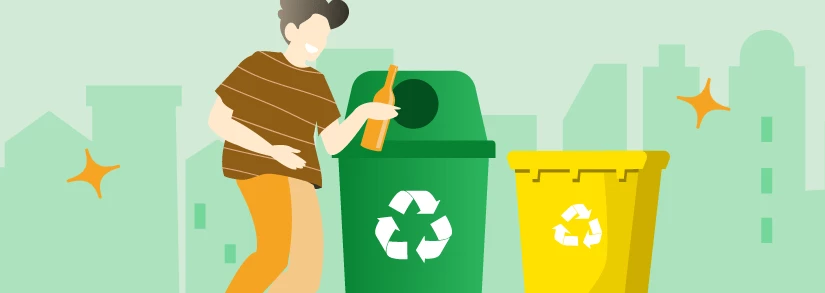Composting and Organic Waste: How to Get Started

Composting is a core component of modern waste management in Ireland. With the introduction of mandatory Brown Bins nationwide, composting practices offer householders significant opportunities to reduce waste collection costs and contribute positively to the environment.
Defining Composting and Organic Waste
Composting is the natural process where organic materials—such as food scraps, yard trimmings, and other plant-based waste—are broken down by organisms like bacteria, fungi, and worms.
The end product is compost, an earthy substance rich in minerals and nutrients used to enhance soil health.
The time required for materials to fully break down varies significantly, typically ranging from a few weeks to several months, depending on factors such as material type, weather, temperature, and the health of the compost ecosystem.
Biogas Production: Organics placed in kerb side Brown Bins are often sent to anaerobic digestion facilities, where they are converted into biogas (a renewable fuel source) and nutrient-rich digestate (a fertilizer).
Benefits of Composting Organic Waste
Responsible composting offers both financial and environmental advantages:
- Cost Reduction: Placing organic materials (which are heavy due to water content) unnecessarily in the General Waste bin directly increases bin weight. Since most waste plans operate on a Pay by Weight model, diverting organics into the Brown Bin or a home compost unit significantly lowers collection charges.
- Environmental Compliance: When organic waste is incorrectly placed in the General Waste bin, it is destined for landfill. Landfills are a major source of methane gas, a potent greenhouse gas. Diverting organics is essential for Ireland to meet its climate and recycling goals.
- Soil Improvement: For those with gardens, home composting eliminates the need to purchase artificial fertilizers, which may contain chemicals that disrupt the natural ecological balance of the soil.
It is estimated that organic material makes up roughly 32% of household waste by weight, meaning proper segregation can yield substantial savings on annual waste bills.
How to Start Composting in Ireland
1. Kerbside Collection (Brown Bin)
Following an EPA directive (implemented nationwide in 2024), all waste collection companies are now required to offer a Brown (Organics) Bin to all household customers.
The contents of this bin are collected by your chosen waste collection provider and are sent either to a commercial composting facility or, increasingly, to anaerobic digestion plants. Anaerobic digestion breaks down the waste without oxygen, generating renewable biogas fuel and a nutrient-rich soil improver.
Many providers offer a small, sealable kitchen caddy for easy daily storage of food waste before it is transferred to the main Brown Bin.
2. Home Composting
Households with a garden can purchase or construct a dedicated composting container (composter). These bins are available at garden centres, with small models starting around €20. It is advisable to check with your local authority, as they sometimes run incentive schemes to help residents purchase these units at a discount.
Creating your own compost is ideal for generating free soil nutrients and achieving maximum weight reduction on your Brown Bin collection fees. Detailed guides on bin maintenance, ideal moisture content, and beneficial agents are widely available from organizations like the EPA.
3. Civic Amenity Centres
Civic Amenity Centres (Recycling Centres) are sites that accept a wide variety of household waste, including organic waste (green waste). These sites are free to use for reasonable household quantities and have staff available to provide guidance on segregation.
Organic material collected at these centres is typically sent for commercial composting or anaerobic digestion. Always check your local council's website for facility locations and confirmation of accepted waste types before travelling.
Material Guidance for Organics Bins
A general guideline for organics is: if it was once living, it is suitable for composting. However, different materials have different rules depending on whether you are using a kerb side Brown Bin or a home compost unit.
✅ Accepted in the Kerbside Brown Bin
Commercial composting and anaerobic digestion facilities can handle a wider range of materials than a home compost heap:
- Cooked and uncooked food waste (including fruit, vegetables, bread, rice, pasta)
- Meat, fish, bones, and dairy products
- Tea bags, coffee grounds, and paper filters
- Eggshells
- Grass clippings, leaves, and dead flowers
- Soiled paper and cardboard (e.g., pizza boxes soiled with grease)
- Compostable packaging (must be certified EN 13432 and free from food)
❌ Not Accepted in Kerb side or Home Composting
- Any material contaminated with chemicals (e.g., weedkiller, bleach, paint)
- Plastics, metals, and glass (these should go in the Dry Recycling or General Bin)
- Manure from carnivorous pets (dogs and cats – these can contain harmful pathogens and must go in the General Waste bin)
- Large quantities of soil or building rubble
For further guidance on home composting, including what materials to restrict (like meat and bones, which can attract pests to a home heap), consult the Environmental Protection Agency’s (EPA) composting guides.
